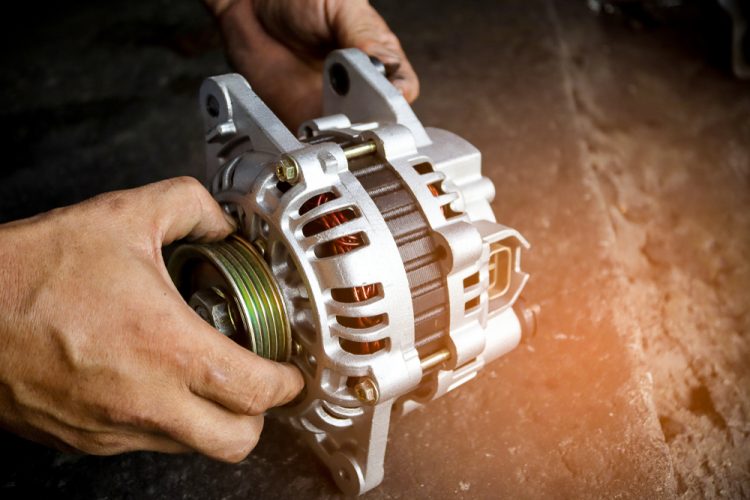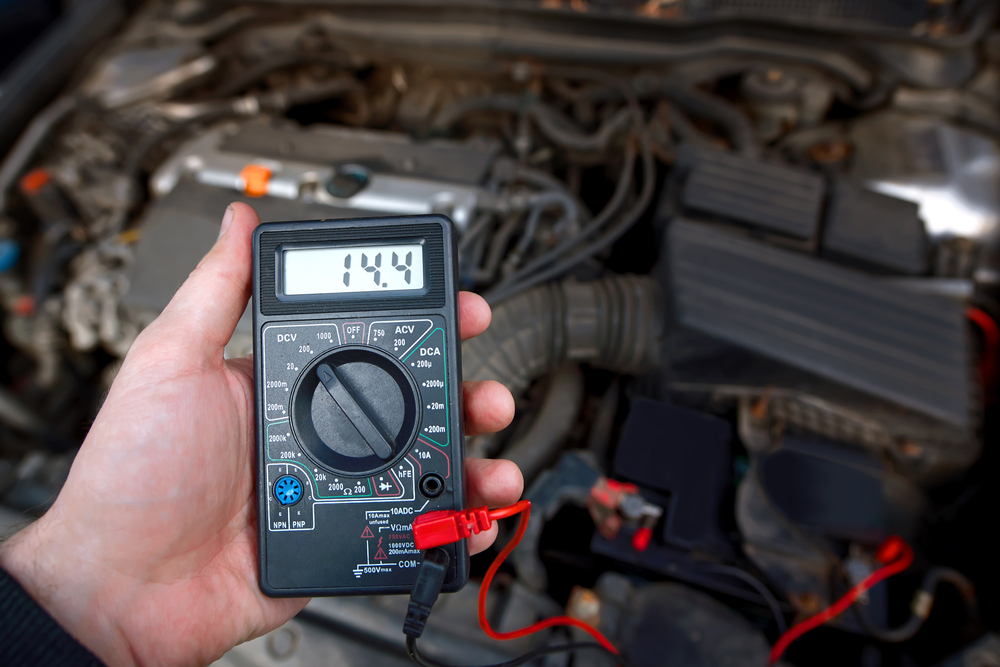
Rebuilding a problematic alternator is something many hobby mechanics used to do at home in the garage. Not so much, anymore, with all the new-fangled computerized systems. It’s a job best left to the professionals at your local repair shop. The average alternator replacement cost is between $400 and $500 for modern vehicles. That covers new parts and labor costs.
What is an Alternator
The alternator helps keep your vehicle’s battery charging all those complicated systems. And when it quits working or quits working right, the battery eventually quits, too. When the radio stops playing music and the headlights go dim, it very likely could be that the alternator is the culprit so it’s a good idea to get it checked.
Common Symptoms of a Bad Alternator
Noticing the signs of a failing alternator sooner rather than later can be the difference between being left on the road somewhere with a dead automobile and not being stranded. Here are some keys signs your alternator may be having a bad day:
- Your check engine light comes on (take it seriously)
- Sluggish engine
- Stuttering engine
- Smell of burning rubber
In most of today’s newer vehicles, you can scroll through many of your engine’s important vital signs through the dashboard screen. Take note that if a missing fan belt has caused the issue, your air conditioner and power steering may also be affected, as well as an overheated engine, as they all share the same belt.
Understanding the Alternator System
This small but vital component has an important part to play. Even when your ride isn’t actively running, the battery continues charging everything. However, once you turn the key, the alternator clocks in. It’s responsible for powering your headlights, electric steering, power windows, windshield wipers, heated seats, dashboard instruments and sound system.
And of course, the battery is also working while you drive!
Key Components
Key components of an alternator include: pulley, rotor, stator, voltage regulator and rectifier.
- Pulley: The pulley is powered by that all-important serpentine belt, which is in turn powered by the crankshaft.
- Rotor: A cylindrical part with magnetic components.
- Stator: The case for the rotor which includes copper wire to assist in the alternating current mechanism.
- Voltage regulator: Controls the electrical energy output so it doesn’t overwhelm the system with too much or underwhelm with too little charge.
- Rectifier: Converts the alternating current (AC) into the direct current (DC) necessary to power the electrical systems.
Charging System
Using a pulley and drive belt, the alternator’s rotor shaft spins magnets located in a coil, causing alternating current (AC) in the stator. This current moves along to the rectifier, where it is transformed into a DC current that powers the car’s electrical systems.

Why do Alternators Fail?
Alternators are designed to last. In many cases, you’ll never need to repair or switch out your car’s alternator. In some instances, the design of a car’s electrical systems and its needs may cause the alternator to work harder than normal. It’s possible to switch out your part with one equipped with higher amperage if that happens to be the case.
Wear and Tear
The belt that powers this key part does need to be replaced, but it’s a simple fix and inexpensive. If you ever do need to replace your alternator, the best way is to replace the belt at the same time to reduce your hourly labor charge.
Bad Voltage Regulator
Since this piece is responsible for regulating the electrical current, it’s important to understand when it may need to be replaced. Too much voltage can damage a sensitive system. Too little and … well, we’ve already talked about being stranded on the side of the road. You may get some warning signs when the voltage regulator is misbehaving: warning lights, dim lighting systems, car battery issues and you know those weird flickering lights in the horror movie? If that starts happening inside your car, you better get it checked.
The better choice is to always check your car out when you notice any factors indicating electrical problems.
Belt and Pulley Issues
Your vehicle is equipped with a variety of parts that will wear out and need replacing at various times. The belt is made of flexible rubber and can become dry and cracked. Also known as the serpentine belt, if you don’t replace it when necessary, you’ll begin to lose functionality.
How to Check for Problems
Because problems with a faulty alternator can present similarly to other issues (hello, dead battery), there are some simple tests you can do at home to narrow down the bad actor.
Test the Charging System
To check if your problem is a bad alternator or the battery, jumpstart your engine. If it continues to run, it’s most likely a battery problem. If it doesn’t, probably blame the alternator.
Checking the Voltage
If you have a voltage meter, you can check your output at home. Just set the meter to DC, turn the engine off and connect the meter to the battery. It should be about 12.5 volts. When the engine is on, you should get a reading of 13.5 to 14.5 volts.
Alternatively, take your vehicle to an auto parts store or your favorite professional mechanic and ask them to check the voltage.
Why You Shouldn’t Wait to Repair
A failing regulator can cause other issues if it isn’t caught early and fixed. Some of your vehicle’s electrical components, such as the water and fuel pumps, power steering and more can be damaged. What started out as a doable service repair could turn into a complete engine overhaul.
Alternator Repair vs. Alternator Replacement
It’s OK to choose a refurbished or used alternator to save some money if you need to replace this vital part. If you are handy, you can buy a rebuild kit for around $30 to $60 and do it yourself. Most people look at all the factors and choose to take it to a car repair shop.
Protect Your Vehicle with Comprehensive Coverage from Freeway Insurance
Comprehensive auto coverage is like a well-oiled and working alternator. It takes care of many aspects of being safe on the road. At Freeway, we are interested in helping you take care of your vehicle – as well as letting us take care of you. Check us out online for a free online quote for car insurance, give us a call at (800) 777-5620 or stop by one of our convenient locations for a chat.



